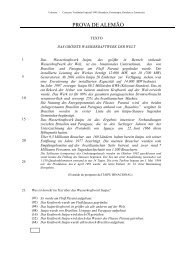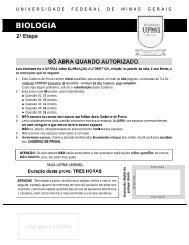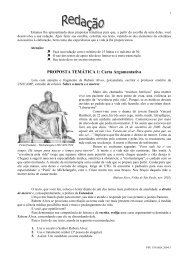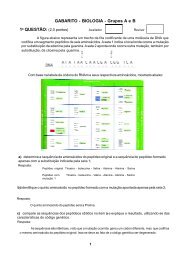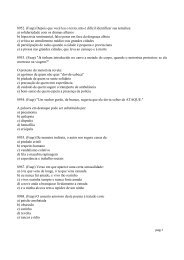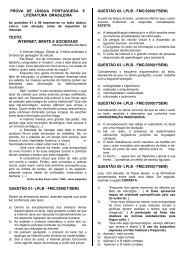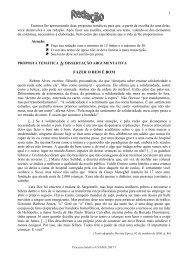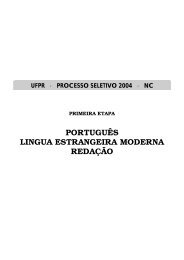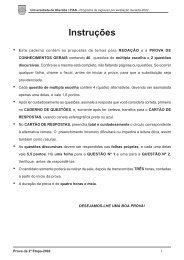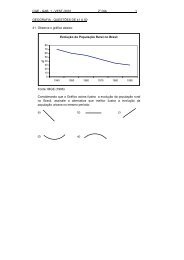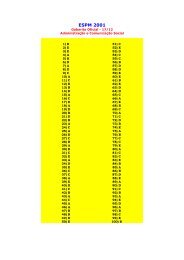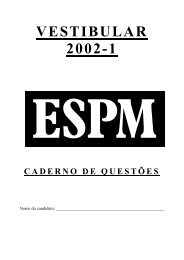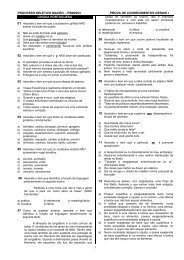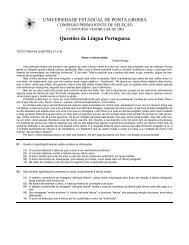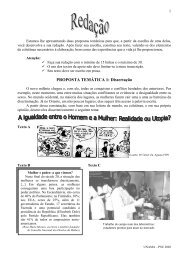inglês - relações internacionais - CNEC On Line
inglês - relações internacionais - CNEC On Line
inglês - relações internacionais - CNEC On Line
You also want an ePaper? Increase the reach of your titles
YUMPU automatically turns print PDFs into web optimized ePapers that Google loves.
PUC PUC - RIO<br />
RIO<br />
VESTIBULAR VESTIBULAR 2010<br />
2010<br />
INGLÊS - RELAÇÕES INTERNACIONAIS<br />
LEIA ATENTAMENTE AS INSTRUÇÕES ABAIXO.<br />
01 - Você recebeu do fiscal o seguinte material:<br />
a) este caderno, com o enunciado das 20 questões objetivas de INGLÊS - RELAÇÕES INTERNACIONAIS;<br />
b) um CARTÃO-RESPOSTA, com seu nome e número de inscrição, destinado às respostas das questões<br />
objetivas formuladas na prova de INGLÊS - RELAÇÕES INTERNACIONAIS.<br />
02 - Verifique se este material está em ordem, se o seu nome e número de inscrição conferem com os que aparecem<br />
no CARTÃO. Caso contrário, notifique IMEDIATAMENTE ao fiscal.<br />
03 - Após a conferência, o candidato deverá assinar no espaço próprio do CARTÃO, preferivelmente a caneta<br />
esferográfica de tinta na cor preta.<br />
04 - No CARTÃO-RESPOSTA, a marcação das letras correspondentes às respostas certas deve ser feita<br />
preenchendo todo o espaço do círculo, a lápis preto n o 2 ou caneta esferográfica de tinta na cor preta,<br />
com um traço contínuo e denso. A LEITORA ÓTICA utilizada na leitura do CARTÃO-RESPOSTA é sensível<br />
a marcas escuras, portanto, preencha os campos de marcação completamente, sem deixar claros.<br />
Exemplo: A C D E<br />
05 - Tenha muito cuidado com o CARTÃO, para não o DOBRAR, AMASSAR ou MANCHAR.<br />
O mesmo SOMENTE poderá ser substituído caso esteja danificado em suas margens superiores<br />
e/ou inferiores − BARRA DE RECONHECIMENTO PARA LEITURA ÓTICA.<br />
06 - Para cada uma das questões objetivas são apresentadas 5 alternativas classificadas com as letras<br />
(A), (B), (C), (D) e (E); só uma responde adequadamente ao quesito proposto. Você só deve assinalar<br />
UMA RESPOSTA: a marcação em mais de uma alternativa anula a questão, MESMO QUE UMA DAS<br />
RESPOSTAS ESTEJA CORRETA.<br />
07 - As questões são identificadas pelo número que se situa acima de seu enunciado.<br />
08 - SERÁ ELIMINADO do Concurso Vestibular o candidato que:<br />
a) se utilizar, durante a realização das provas, de máquinas e/ou relógios de calcular, bem como de rádios<br />
gravadores, headphones, telefones celulares ou fontes de consulta de qualquer espécie;<br />
b) se ausentar da sala em que se realizam as provas levando consigo o CADERNO DE QUESTÕES<br />
e/ou o CARTÃO-RESPOSTA;<br />
c) não assinar a Lista de Presença e/ou o CARTÃO.<br />
09 - Reserve os 30 (trinta) minutos finais para marcar seu CARTÃO-RESPOSTA. Os rascunhos nos Cadernos de<br />
Questões NÃO SERÃO LEVADOS EM CONTA.<br />
10 - Quando terminar, entregue ao fiscal o CADERNO DE QUESTÕES e o CARTÃO-RESPOSTA E ASSINE<br />
A LISTA DE PRESENÇA.<br />
11 - O TEMPO DISPONÍVEL PARA ESTA PROVA DE QUESTÕES OBJETIVAS É DE 2 (DUAS)<br />
HORAS.<br />
BOA PROVA!<br />
Outubro / 2009
5<br />
10<br />
15<br />
20<br />
25<br />
30<br />
35<br />
40<br />
45<br />
INGLÊS - RELAÇÕES INTERNACIONAIS<br />
TEXT 1<br />
After The Fall: 1989, Twenty Years <strong>On</strong><br />
INGLÊS - RELAÇÕES INTERNACIONAIS<br />
PUC PUC - - - RIO RIO 2010<br />
2010<br />
Joshua Muravchik<br />
Nineteen eighty-nine was a most extraordinary year.<br />
There are other years that are imprinted on historic<br />
memory, yet most of them were occasions for horrible<br />
events (1917 or 1939) or disappointing ones (1789 or<br />
1848) or the conclusions of great tragedies (1648 or<br />
1945). The year 1989 was that rare moment when<br />
dramatic things happened that were overwhelmingly<br />
beneficent. As we watched the world change before our<br />
eyes, we learned many things. Looking back today on<br />
how the world has evolved in twenty years since that<br />
momentous time, we can distill several additional<br />
insights.<br />
The economist Robert Heilbroner wrote in 1989:<br />
“Less than 75 years after it officially began, the contest<br />
between capitalism and socialism is over: capitalism has<br />
won.” This outcome reflected a startling reversal because<br />
as recently as the decade before, socialism —<br />
considering all its diverse forms lumped together —<br />
seemed at the apex of its global sweep, apparently<br />
confirming Marx’s prophecy that it was not merely<br />
desirable but destiny.<br />
Heilbroner’s observation was noteworthy because<br />
he himself was not unsympathetic to socialism, and<br />
doubly so because he was no communist. Given the<br />
hostile breach between communism and democratic<br />
socialism, why should Heilbroner have conceded that<br />
the fall of the Soviet empire was tantamount to the end<br />
of socialism? Why did he not accept the claim advanced<br />
by some socialists that the end of communism would<br />
only clear the way for a purer form of socialism?<br />
Heilbroner also saw that the fall of communism<br />
culminated a trend. With social democratic parties having<br />
already forsaken the dream of replacing capitalism and<br />
with the developing world having realized that markets<br />
rather than state planning offered the surest path from<br />
poverty, the Soviet collapse sealed the issue. Socialism<br />
was finished.<br />
Has the economic meltdown of 2008–09 reopened<br />
the question? Is socialism on the table again? Not at all.<br />
It only shows that you can always have too much of a<br />
good thing. The fact that free markets are the best<br />
mechanism for making economic decisions does not<br />
imply that freer is always better. The smooth functioning<br />
of the private sector depends on government to maintain<br />
a legal framework, to protect the public against<br />
2<br />
50<br />
55<br />
60<br />
65<br />
70<br />
75<br />
80<br />
85<br />
90<br />
95<br />
unscrupulous behavior, and to provide vital goods that<br />
are not profitable for the private sector to furnish.<br />
Libertarians who dream of an economy entirely free of<br />
government are no less utopian than socialists.<br />
In the realm of politics Mikhail Gorbachev has cut a<br />
sad figure these last two decades: first supporting Putin<br />
then criticizing him, clinging to vestiges of socialist ideas,<br />
and rebuking Washington for necessary exercises of<br />
power, all the while unable to raise his own popularity<br />
among his countrymen above single digits. Nonetheless,<br />
he is arguably the greatest figure of the twentieth century.<br />
The most famous names of the century were mass<br />
murderers. Of those who are remembered for the good<br />
they did, who was irreplaceable? The Axis would have<br />
been defeated without Roosevelt and even without<br />
Churchill, although Britain might have fallen first. India<br />
would have gained independence without Gandhi.<br />
Segregation would have been ended in America without<br />
Martin Luther King Jr. But would the Soviet empire have<br />
dissolved, the Cold War ended, and communism been<br />
repealed — all these blessings achieved peacefully —<br />
without Gorbachev?<br />
I don’t think so. It has been argued that the Soviet<br />
Union collapsed under the dead weight of its absurd<br />
economy, but its economy had been absurd for<br />
generations and it had not collapsed. Would Soviet<br />
inefficiency and low productivity eventually have brought<br />
the whole system to its knees? Perhaps, but that might<br />
have taken generations more — and in the meantime<br />
the state might have been able to replenish itself by means<br />
of blackmail and plunder, or it might, in its desperation,<br />
have generated a new world war. The dinosaur’s brain<br />
was dead, but its massive tail still might have lashed<br />
destructively.<br />
Yes, goods and construction were shoddy:<br />
televisions containing cardboard parts sometimes<br />
combusted spontaneously in people’s living rooms<br />
(except that most Soviet citizens didn’t have living<br />
rooms). But the weapons worked, and while a tad less<br />
advanced than those of America, what the Red Army<br />
lacked in quality it made up for in quantity.<br />
In other words, despite its economic difficulties, the<br />
Kremlin fielded as much military might as it wished, more<br />
than any other state then or ever. If this required<br />
shortchanging the consumer sector of the economy, so<br />
be it. No one dared complain. Further, the rule of the<br />
Communist Party was entirely unchallenged, as was<br />
Gorbachev’s ascendancy within the party, at least until<br />
very late in the game. He was the most powerful single<br />
individual on earth, and he could have held that power —<br />
and all the perks that went with it — until he went to his<br />
grave, as had most of his predecessors. Instead he<br />
tossed it away.<br />
WORLD AFFAIRS, Vol. 13. n o 2, Summer 2009.<br />
http://www.worldaffairsjournal.org/2009%20-%20Summer/full-<br />
Muravchik.html
1<br />
What is the main purpose of the text?<br />
(A) Justify Gorbachev’s resistance against the Glasnost and<br />
Perestroika.<br />
(B) Blame the end of communism for the economic meltdown<br />
of 2008-09.<br />
(C) Report on the disastrous political events that impacted<br />
the world after 1989.<br />
(D) Discuss the relevance of the Soviet collapse for the current<br />
state of world affairs.<br />
(E) Explain the importance of Churchill, Gandhi and Martin<br />
Luther King to the economic scenario of our times.<br />
2<br />
In paragraph 1, the year 1989 is described as a momentous<br />
time because it was a(n)<br />
(A) historical moment of stability that will find no parallel with<br />
other time periods.<br />
(B) significant historical moment when extraordinarily<br />
fortunate events took place.<br />
(C) awesome occasion that marked the end of a tragic era,<br />
though not quite peacefully.<br />
(D) very brief moment in time when people forgot about the<br />
tragic events that had been affecting humanity.<br />
(E) remarkable moment of tranquility among nations in which<br />
the conflicts between communism and democratic<br />
socialism came to an end.<br />
3<br />
According to the author of the text, the economist Robert<br />
Heilbroner<br />
(A) supported socialism and thus severely criticized the defeat<br />
of capitalism.<br />
(B) recognized that the sudden fall of the Soviet empire could<br />
have been avoided.<br />
(C) claimed that capitalism had defeated socialism through<br />
hostile belligerent means.<br />
(D) admitted that socialism was no longer a political solution<br />
after the fall of the Soviet empire.<br />
(E) believed that the end of communism would make way for<br />
a purer form of socialism to emerge.<br />
4<br />
Muravchick does not defend a libertarian viewpoint since he<br />
advocates that<br />
(A) communism is really the best solution for the<br />
unscrupulous behavior of the private sector.<br />
(B) the government has no right to restrict the actions and<br />
economic decisions of capitalist companies.<br />
(C) free markets without any legal restrictions will allow for<br />
more profitable economic results.<br />
(D) the only economic system that can eliminate poverty<br />
without governmental support is capitalism.<br />
(E) the government has a role in protecting the citizens against<br />
the destructive attitudes of private enterprises.<br />
PUC PUC PUC - - - RIO RIO 2010<br />
2010<br />
3<br />
5<br />
Gorbachev, according to Muravchik, has<br />
(A) made a poor impression of himself to the world lately.<br />
(B) gained enormous popularity among his fellow citizens.<br />
(C) fully supported Washington criticisms of socialist ideas.<br />
(D) approved the American government’s defense of free<br />
markets.<br />
(E) been considered, unquestionably, the greatest political<br />
figure of the modern world.<br />
6<br />
The fragment “all these blessings” (line 66) refers to the<br />
(A) divine inspiration that put an end to Gorbachev’s<br />
administration.<br />
(B) end of the Cold War, the rejection of communism and the<br />
Independence of India.<br />
(C) peaceful riot lead by Martin Luther King struggling against<br />
segregation in America.<br />
(D) questionable role that Churchill and Roosevelt played in<br />
leading the Allies to victory.<br />
(E) positive consequences derived from the bloodless end of<br />
the Cold War and defeat of communism.<br />
7<br />
Mark the alternative that contains a correct match of meaning,<br />
considering the use of the word in the text.<br />
(A) “lumped” (line 18) – split<br />
(B) “conceded” (line 26) – denied<br />
(C) “forsaken” (line 33) – abandoned<br />
(D) “rebuking” (line 53) – praising<br />
(E) “perks” (line 96) – disadvantages<br />
8<br />
Choose the alternative in which the word in bold type and<br />
the italicized one convey equivalent ideas.<br />
(A) “… yet most of them were occasions for horrible events…”<br />
(lines 3-4) – thus<br />
(B) “Nonetheless, he is arguably the greatest figure...”<br />
(lines 55-56) – moreover<br />
(C) “…although Britain might have fallen first.” (line 61) –<br />
while<br />
(D) “In other words, despite its economic difficulties,”<br />
(line 87) – regardless of<br />
(E) “Further, the rule of the Communist Party…” (lines 91-<br />
92) – meanwhile<br />
9<br />
In “Would Soviet inefficiency and low productivity eventually<br />
have brought the whole system to its knees?” (lines 71-73),<br />
the expression “bring the system to its knees” could be<br />
paraphrased by<br />
(A) force the system to submit.<br />
(B) mitigate the impact of economy.<br />
(C) enhance the power of the system.<br />
(D) defeat those who oppose the system.<br />
(E) improve the functioning of the system.<br />
INGLÊS - RELAÇÕES INTERNACIONAIS
10<br />
In the fragment “India would have gained independence without<br />
Gandhi.” (lines 61-62), the author conveys<br />
(A) the frustration of having lost a charismatic leader.<br />
(B) the unlikely political result after a very dramatic event.<br />
(C) his conviction of an outcome, given a different historical<br />
scenario.<br />
(D) his uncertainty about the strength of peaceful popular<br />
movements.<br />
(E) a remote possibility under the circumstance of a<br />
hypothetical situation.<br />
11<br />
When the author comments “I don’t think so.” (line 68) he<br />
expresses that<br />
(A) Gorbachev should not be accused of mass murder as he<br />
was a peaceful leader.<br />
(B) Gorbachev was insensitive to world issues and the<br />
dramatic state of the Soviet economy.<br />
(C) only a new world war would have changed the state of<br />
political affairs between the US and the Soviet Union.<br />
(D) the inefficiency of Soviet industry and commerce would<br />
have definitely destroyed the nation in a short time.<br />
(E) the nonbelligerent end of communism and the Cold War<br />
was a direct result of the Soviet leader’s political<br />
decisions.<br />
12<br />
The metaphor of the dinosaur’s brain and its tail used in<br />
lines 77-79, represents, respectively, the<br />
(A) Soviet economy and the Red Army.<br />
(B) Soviet union and the new world war.<br />
(C) Soviet political regime and its economy.<br />
(D) old and new generations in the Soviet Union.<br />
(E) state officials and blackmailers/plunderers.<br />
13<br />
In terms of reference, it is correct to affirm that<br />
(A) “ones” (line 4) refers to “years”.<br />
(B) “It” (line 40) refers to “meltdown”.<br />
(C) “his” (line 54) refers to “Putin”.<br />
(D) “its” (line 87) refers to “Red Army”.<br />
(E) “it” (line 96) refers to “individual”.<br />
INGLÊS - RELAÇÕES INTERNACIONAIS<br />
PUC PUC - - - RIO RIO 2010<br />
2010<br />
4<br />
TEXT 2<br />
Fragments 1 and 2 below were extracted from Joshua<br />
Muravchik’s original article “After the Fall: 1989, Twenty Years<br />
<strong>On</strong>”. Read them and the comments that follow in order to<br />
answer questions 14 through 20 below.<br />
5<br />
10<br />
15<br />
20<br />
25<br />
30<br />
35<br />
40<br />
45<br />
50<br />
FRAGMENT 1, from Joshua Muravchik’s original article:<br />
But even as we in the West saw the defeat of communism<br />
as a triumph for our ways and values, other observers<br />
saw it quite differently. Osama bin Laden and his cohorts<br />
and sympathizers believed the Soviet Union had been<br />
defeated not by us but by the Muslim believers of<br />
Afghanistan and the foreign jihadists who had joined their<br />
ranks. Far from demonstrating that our civilization<br />
represented an end point, it proved its transience. If radical<br />
Islam could defeat one superpower, it could defeat the<br />
other. If it had outlasted communism, it would outlast<br />
democratic capitalism, too.<br />
A dozen years after 1989—on September 11, 2001, to<br />
be exact—this new ideology shattered the peace of the<br />
post-history world. It poses a challenge that cannot be<br />
dismissed by Francis Fukuyama’s observation that no<br />
species of nationalism can pose a historic challenge to<br />
democratic capitalism because they inherently lack<br />
“universal significance.” For one thing, Islamism purports<br />
to speak for a populace—the umma or world community<br />
of believers—larger than that comprised by any mere<br />
nation. More important, its aspirations encompass all<br />
mankind.<br />
COMMENT 1, Posted by Syed Qamar Afzal Rizvi |<br />
July 22, 2009 4:09 AM EDT<br />
Having fully endorsed the views of Joshua Muravchik, I<br />
would like to add that the apparently ending of the<br />
Cold War era has not yet fulfilled the prophesies—of<br />
those peace-minded optimists who had thought that<br />
the world beyond the year 1989 would probably usher<br />
in the new heraldry of peace and prosperity—in so far<br />
as a neo–Cold War seems to have begun between the<br />
Islamists and the non-Islamists (an era of the West’s<br />
economic indoctrination of controlling the strategic<br />
developing world).<br />
FRAGMENT 2, from Joshua Muravchik’s original article:<br />
The picture is not completely rosy. There is powerful<br />
evidence that where ruthless rulers are prepared to employ<br />
it, repression continues to succeed. In 1989, while<br />
freedom fighters against communism triumphed all over<br />
Europe, protesters in China’s Tiananmen Square were<br />
brutally repressed. At the time, it seemed that this bloody<br />
deed would postpone the inevitable only briefly. As<br />
America’s former ambassador to that country, Winston<br />
Lord, wrote: “The current discredited regime is clearly a<br />
transitional one. . . . We can be confident that, however<br />
grim the interlude, a more enlightened leadership will<br />
emerge within a few years. . . . It may well turn out that<br />
the tragic events in China this year have foreshortened<br />
that great nation’s march toward democracy.”
55<br />
60<br />
65<br />
Twenty years later, while China’s standard of living has<br />
soared, freedom has advanced scarcely if at all. Nor is<br />
China alone. Communist regimes also hang on with<br />
apparent ease in Cuba, North Korea, Vietnam, Cambodia,<br />
and Laos.<br />
COMMENT 2, Posted by Jason Ryan | July 30, 2009<br />
5:21 PM EDT<br />
This article presupposes that democracy is universal.<br />
I would argue that it is not, as the author pointed out in<br />
the case of China. Economic freedom and expansion<br />
are not necessarily democratic and it’s easy to envision<br />
a world of many powers of a China or Putanist model.<br />
The biggest threat to democracy is not from outsiders<br />
but from nations that are unable to see through the<br />
inevitably difficult process of democratization. In my<br />
opinion, democracy may be universal in its appeal but<br />
it is by no means inevitable in practice.<br />
Comments extracted from:<br />
http://www.worldaffairsjournal.org/2009%20-%20Summer/comments/<br />
comments-Muravchik.html<br />
14<br />
In Fragment 1, Joshua Muravchick exposes his view that<br />
(A) radical Islamism would outlast democratic capitalism.<br />
(B) no nationalistic ideology will challenge capitalistic<br />
democracy.<br />
(C) the westerners believe that it was capitalism that defeated<br />
socialism.<br />
(D) believers of Islamism have aspirations that represent all<br />
of humanity.<br />
(E) September 11, 2001 shattered peace in the same way<br />
that the events in 1989 did.<br />
15<br />
“This new ideology” (Fragment 1 – line 14) refers to the idea<br />
that<br />
(A) democratic capitalism should prevail over Islamic<br />
aspirations.<br />
(B) democratic capitalism is strong enough to survive<br />
communism.<br />
(C) our civilization will endure despite the constant fights<br />
between superpowers.<br />
(D) Islam is capable of outliving not only communism but<br />
also democratic capitalism.<br />
(E) the Soviet Union was not strong enough to defeat Muslim<br />
believers and sympathizers.<br />
16<br />
Both Fragment 1 and Comment 1 discuss the<br />
(A) peace and prosperity that has emerged from the Islamic<br />
doctrine.<br />
(B) economic dominance of the West as the cause for the<br />
defeat of communism.<br />
(C) inadequacy of the expression neo-Cold War to refer to<br />
the Islamic–capitalist conflict.<br />
(D) lack of challenge to democratic capitalism as defended<br />
by peace-minded optimists.<br />
(E) current state of affairs between Islamists and<br />
sympathizers versus the non-Islamists.<br />
PUC PUC PUC - - - RIO RIO 2010<br />
2010<br />
5<br />
17<br />
China is mentioned in both Fragment 2 and Comment 2<br />
because<br />
(A) China does not seem to represent a menace to<br />
democratic institutions.<br />
(B) Chinese protesters in 1989 were not repressed by the<br />
authoritative regime.<br />
(C) Chinese leaders will never understand the benefits of<br />
economic freedom.<br />
(D) it has still not attained total democracy, despite the<br />
growth of its economy.<br />
(E) its model of government will certainly remain unchanged<br />
for the next few years.<br />
18<br />
Fukuyama’s observation in Fragment 1 and Winston Lord’s<br />
words in Fragment 2 reveal that these men are<br />
(A) optimistic about the triumph of democracy.<br />
(B) hopeful about the aspirations of future generations.<br />
(C) enthusiastic about the advances of nationalism worldwide.<br />
(D) enraged with the brutal violation of human rights in China.<br />
(E) indifferent to the attacks democratic capitalism has been<br />
suffering.<br />
19<br />
“Usher in” (Comment 1 – lines 30-31) and “see through”<br />
(Comment 2 – line 64) can be correctly substituted by,<br />
respectively<br />
(A) ‘conclude’ and ‘analyze’.<br />
(B) ‘announce’ and ‘restore’.<br />
(C) ‘precede’ and ‘overlook’.<br />
(D) ‘investigate’ and ‘neglect’.<br />
(E) ‘introduce’ and ‘comprehend’.<br />
20<br />
Concerning the authors’ reactions in Comment 1 and<br />
Comment 2, it is correct to affirm that<br />
(A) both Syed Rizvi and Jason Ryan are completely supportive<br />
of the ideas advanced by Muravchik in Fragments 1 and 2.<br />
(B) neither Syed Rizvi nor Jason Ryan provide a critical<br />
analysis of the issues introduced by Muravchik in<br />
Fragments 1 and 2.<br />
(C) Syed Rizvi totally agrees with Muravchik’s ideas in<br />
Fragment 1, while Jason Ryan expresses a point of view<br />
about democratization which diverges from that exposed<br />
in Fragment 2.<br />
(D) Syed Rizvi expands some of the ideas introduced by<br />
Muravchik in Fragment 1 whereas Jason Ryan reinforces<br />
the perspectives advanced in Fragment 2.<br />
(E) Syed Rizvi, in Fragment 1, is not fully convinced of<br />
Muravchik’s opinions about the end of the Cold War, while<br />
Jason Ryan’s comments express complete approval of<br />
Muravchik’s views on democracy in Fragment 2.<br />
INGLÊS - RELAÇÕES INTERNACIONAIS
VESTIBULAR PUC-Rio 2010<br />
GABARITO - INGLÊS – OBJETIVA – RELAÇÕES INTERNACIONAIS<br />
1) Resposta: (D) Discuss the relevance of the Soviet collapse for the current state of world affairs.<br />
Para acertar esta questão de compreensão de texto, o candidato deverá ser capaz de perceber o propósito<br />
do texto. A única alternativa correta é a (D) que significa ‘discutir a relevância do colapso da nação soviética<br />
para a situação em que hoje se encontra o mundo.<br />
As demais alternativas não expressam o propósito do texto quando afirmam que seria:<br />
(A) justificar a resistência de Gorbachev à Glasnost e Perestroika;<br />
(B) atribuir ao fim do comunismo o desastre econômico de 2008-9;<br />
(C) relatar os eventos políticos desastrosos que impactaram o mundo após 1989;<br />
(D) explicar a relevância de Churchill, Gandhi e Martin Luther King para o cenário econômico dos tempos<br />
atuais.<br />
2) Resposta: (B) significant historical moment when extraordinarily fortunate events took place.<br />
O acerto desta questão de compreensão localizada depende da percepção de que a expressão ‘momentous<br />
time’ refere-se a um evento de importância ou consequência de grande impacto e, portanto, o candidato<br />
deverá depreender to texto a que evento ou aspecto o autor faz referência. O gabarito é (B), pois o autor<br />
está destacando que 1989 é ‘um momento histórico de grande significância em que ocorreram eventos de<br />
resultados benéficos’, conforme o que afirma nas linhas 6 e 7 “The year 1989 was that rare moment when<br />
dramatic things happened that were overwhelmingly beneficent.”<br />
As demais alternativas não encontram respaldo no trecho e não podem ser consideradas justificativas para<br />
a expressão destacada no comando da questão.<br />
3) Resposta: (D) admitted that socialism was no longer a political solution after the fall of the Soviet<br />
empire.<br />
O acerto desta questão de compreensão localizada depende do candidato perceber a argumentação do<br />
autor sobre a posição de Heilbroner. Somente a alternativa (D) expressa corretamente a postura do<br />
economista, ou seja: ‘admitiu que o socialismo, após a queda do império soviético, não era mais uma<br />
solução política”, como pode ser depreendido do parágrafo 4.<br />
As demais alternativas não correspondem às idéias do economista Robert Heilbroner expressas no texto.<br />
4) Resposta: (E) the government has a role in protecting the citizens against the destructive attitudes<br />
of private enterprises.<br />
Para acertar esta questão de compreensão localizada, o candidato precisa perceber a visão expressa pelo<br />
autor no quinto parágrafo. A única alternativa correta é a (E) que afirma que ‘o governo tem o papel de<br />
proteger os cidadãos contra as atitudes destrutivas das empresas privadas’.<br />
As demais alternativas não apresentam idéias que tenham respaldo no texto.<br />
5) Resposta: (A) made a poor impression of himself to the world lately.<br />
O candidato, para acertar esta questão deverá perceber o que o autor comenta sobre Gorbachev. Somente<br />
a letra (A) contém uma afirmativa correta, pois diz que Gorbachev ‘passou uma má impressão de si para o<br />
mundo, nos últimos tempos’. Tal afirmativa encontra suporte no sexto parágrafo, às linhas 51-55.<br />
As demais alternativas não condizem com as informações do texto.<br />
6) Resposta: (E) positive consequences derived from the bloodless end of the Cold War and defeat of<br />
communism.<br />
Para acertar esta questão, o candidato deverá depreender a que se refere, no texto, a expressão destacada<br />
no comando (“todas essas bênçãos”). A alternativa (E) é a única correta, pois remete às ‘consequências<br />
positivas provenientes do fim pacífico da Guerra Fria e à derrubada do comunismo.’<br />
As demais alternativas não apresentam idéias que estejam alinhadas com as informações do texto.<br />
7) Resposta: (C) “forsaken” (line 33) – abandoned<br />
O acerto desta questão de sinonímia depende do candidato entender o sentido das palavras destacadas, no<br />
contexto apresentado no texto. O gabarito é (C), pois somente a palavra ‘forsaken’ está corretamente<br />
explicada em seu sentido de ‘abandonado’.<br />
1
Nas demais alternativas, o sentido adequado dos termos destacados não está correto, já que o certo seria o<br />
entender ‘lumped’, em (A), como ‘reunidas’; ‘conceded’, em (B), como ‘admitido’; ‘rebuking’, em (D), como<br />
‘desaprovando’; ‘perks’, em (E), como ‘ vantagens’.<br />
8) Resposta: (D) “In other words, despite its economic difficulties …” (line 87) – regardless of<br />
O acerto desta questão, que testa conhecimento sobre marcadores discursivos, depende da compreensão<br />
dos sentidos e usos destes elementos em seu contexto. O gabarito é (D), pois somente nesta alternativa o<br />
marcador destacado, ‘despite’, está corretamente explicado. Tanto ‘despite’ quanto ‘regardless of’ podem<br />
ser entendidos como ‘apesar de/embora’.<br />
As demais alternativas devem ser descartadas pelos seguintes motivos.<br />
• Em (A), ‘yet’ expressa um contraste (‘no entanto/porém’) e não consequência, como sinalizado por<br />
‘thus’ (‘consequentemente’);<br />
• Em (B), ‘nonetheless’ expressa contraste (‘porém’) e não adição, como sinalizado por ‘moreover’<br />
(‘além disso’);<br />
• Em (C), ‘although’ expressa uma concessão (‘embora’) e não um contraste, como sinalizado por<br />
‘while’ (‘enquanto’/ ‘ao passo que’);<br />
• Em (E), ‘further’ expressa adição (‘além disso/ademais’) e não contraste, como sinalizado por<br />
‘meanwhile’ (‘enquanto isso’).<br />
9) Resposta: (A) force the system to submit.<br />
Para acertar esta questão de compreensão de expressões idiomáticas, o candidato deverá perceber o<br />
sentido da expressão destacada no texto. ‘To bring someone/something to his/her knees’ significa ‘forçar<br />
alguém a se submeter ou acquiescer’. Somente a alternativa (A) transmite este sentido ao afirmar ‘forçar o<br />
sistema a se submeter’.<br />
As demais alternativas trazem afirmações que não estão de acordo com o sentido do trecho assinalado no<br />
comando da questão.<br />
10) Resposta: (C) his conviction of an outcome, given a different historical scenario.<br />
Para acertar esta questão de compreensão localizada e leitura crítica, o candidato precisa perceber a idéia<br />
que se sub-entende pelo que o autor expressa em relação aos fatos passados e aos protagonistas<br />
importantes da História. O gabarito é (C), ‘sua convicção de um resultado, caso o cenário histórico tivesse<br />
sido diferente’. Esta afirmação confirma o que diz o autor neste parágrafo (linhas 57-67) quando ele<br />
questiona se os grandes nomes da história do século que fizeram o Bem seriam insubstituíveis. Muravchik<br />
diz que o Eixo teria sido derrotado sem Roosevelt e sem Churchill. E em seguida diz ao leitor que ‘A Índia<br />
teria conquistado a sua independência sem Gandhi.’ Logo, vê-se que o autor acredita que o desenrolar da<br />
independência da Índia teria acontecido sem o grande líder – o que mostra que o autor acredita em um<br />
resultado, mesmo que o cenário histórico tivesse sido diferente.<br />
As demais alternativas não apresentam afirmações que possam ser inferidas a partir do significado do<br />
fragmento destacado.<br />
11) Resposta: (E) the nonbelligerent end of communism and the Cold War was a direct result of the<br />
Soviet leader’s political decisions.<br />
Nesta questão de compreensão de texto, o candidato deverá mostrar ter compreendido a relação da<br />
sentença destacada com o trecho que a antecedeu. Somente a alternativa (E) remete ‘I don’t think so’ (‘eu<br />
acho que não’) ao sentido correto, isto é, ‘a ineficiência da indústria e comércio soviético teriam destruído<br />
definitivamente a nação em pouco tempo’.<br />
As informações contidas nas demais alternativas não estão corretas em relação ao texto, ou não são o foco<br />
da ideia a que o autor está se opondo.<br />
12) Resposta: (C) Soviet political regime and its economy.<br />
Para que o candidato acerte esta questão, deverá depreender os referentes da metáfora retirada do oitavo<br />
parágrafo do texto, interpretando, conforme apresenta o gabarito (C), o cérebro do dinossauro como o<br />
regime político soviético e o rabo como a ‘economia’.<br />
Nas demais alternativas, não estão corretamente representados o sentido dos termos metafóricos da<br />
expressão destacada.<br />
2
13) Resposta: (B) “It” (line 40) refers to “meltdown”.<br />
O acerto desta questão de referência pronominal depende do candidato identificar corretamente a que<br />
termo(s) o pronome destacado nas alternativas se referem. Somente a alternativa (B) apresenta<br />
corretamente o referente, pois os referentes dos dos pronomes destacados nas demais opções não estão<br />
corretamente identificados.<br />
• Em (A) “ones” (line 4) refere-se a “events” (linha 4);<br />
• em (C) “his” (line 54) refere-se a “Gorbachev” (linha 50);<br />
• em (D) “its” (line 87) refere-se a “Kremlin” (linha 88);<br />
• e em (E) “it” (line 96) refere-se a “power” (linha 95).<br />
14) Resposta: (C) the westerners believe that it was capitalism that defeated socialism.<br />
O acerto desta questão de compreensão de texto exige que o candidato tenha depreendido a visão do autor<br />
no fragmento apontado. Somente a alternativa (C) está correta em termos do que foi exposto no texto, ou<br />
seja, que ‘os ocidentais acreditam ter sido o capitalismo que derrotou o socialismo’. Tal afirmativa encontra<br />
respaldo nas linhas 2-4 do Fragmento 1: “But even as we in the West saw the defeat of Communism as a<br />
triumph for our ways and values, other observers saw it quite differently.”<br />
As demais alternativas não expressam a opinião do autor.<br />
A opção (A) significa que o Islamismo radical sobreviveria ao capitalismo democrático, entretanto esta é<br />
uma crença dos seguidores do Islã e seus simpatizantes e não do autor.<br />
A opção (B) afirma que nenhuma ideologia nacionalista desafiaria a democracia capitalista, mas o que o<br />
autor afirma ao citar as palavras de Fukuyama às linhas 16-19 é que nenhuma espécie de nacionalismo<br />
poderia representar uma ameaça histórica ao capitalismo democrático.<br />
A opção (D) diz que os seguidores do Islamismo têm aspirações que representam toda a humanidade,<br />
entretanto o que o Fragmento 1 afirma às linhas 19-22 é que o Islamismo tem a intenção de falar em nome<br />
do povo de um modo geral, mas isto não significa que as aspirações dos representantes do Islamismo<br />
representem aquelas de toda a humanidade.<br />
Finalmente, a opção (E) significa que 11 de setembro de 2001 destroçou a paz da mesma maneira que os<br />
eventos de 1989, mas esta afirmativa não encontra respaldo no texto.<br />
15) Resposta: (D) Islam is capable of outliving not only communism but also democratic capitalism.<br />
Para acertar esta questão, o candidato deverá mostrar que identifica o referente da expressão “This new<br />
ideology” (“Esta nova ideologia”) destacada no comando. O gabarito é (D), que aponta corretamente o<br />
referente como sendo a idéia expressa pelo autor de que ‘o Islã é capaz de sobreviver não só o comunismo,<br />
mas também o capitalismo democrático’, expressa às linhas 11 e 12.<br />
As demais alternativas não interpretam corretamente a ideia a que se refere à expressão “This new<br />
ideology” destacada, pelos seguintes motivos:<br />
• a opção (A) diz que o referente seria a prevalência do capitalismo democrático sobre as aspirações<br />
islâmicas;<br />
• a opção (B) afirma que o referente seria o fato de o capitalismo democrático ser suficientemente<br />
forte para sobreviver ao comunismo;<br />
• a opção (C) diz que o referente seria a noção de que nossa civilização vai prevalecer apesar das<br />
constantes lutas entre as superpotências;<br />
• a opção (E) afirma que o referente seria o fato de a União Soviética não ter sido forte o suficiente<br />
para vencer os muçulmanos e seus simpatizantes.<br />
16) Resposta: (E) current state of affairs between Islamists and sympathizers versus the non-<br />
Islamists.<br />
O acerto desta questão de compreensão de texto exige que o candidato seja capaz de compreender a ideia<br />
discutida tanto no Fragmento 1 quanto no Comentário 1. Somente a alternativa (E) está correta, pois ambos<br />
os textos discutem a situação atual que opõe, de um lado, os seguidores do Islamismo e seus simpatizantes<br />
e, de outro, os não islâmicos.<br />
Tal afirmativa encontra respaldo às linhas 2-4 do Fragmento 1(“But even as we in the West saw the defeat<br />
of Communism as a triumph for our ways and values, other observers saw it quite differently.” ) e às linhas<br />
31-35 do Comentário 1 (“… in so far as a neo–Cold War seems to have begun between the Islamists and<br />
the non-Islamists (an era of the west's economic indoctrination of controlling the strategic developing world).”<br />
3
As demais opções devem ser descartadas, pois não conferem com o que é dito nos textos contidos no<br />
Fragmento 1 e no Comentário 1.<br />
A opção (A) significa que a paz e a prosperidade emergiram da doutrina Islâmica.<br />
A opção (B) diz que o domínio econômico do ocidente foi a causa da derrota do Comunismo.<br />
A opção (C) aborda a inadequação da expressão “Nova Guerra Fria” para se referir ao conflito islâmicocapitalista.<br />
A opção (D) aborda a ausência de desafios ao capitalismo democrático, como defendido pelos pacifistas<br />
otimistas.<br />
17) Resposta: (D) it has still not attained total democracy, despite the growth of its economy.<br />
O acerto desta questão de compreensão de texto exige que o candidato seja capaz de compreender o<br />
porquê de a China ser mencionada tanto no Fragmento 2 quanto no Comentário 2. Somente a alternativa<br />
(D) está correta, pois ambos os textos transmitem a ideia de que o país em questão ainda não atingiu a total<br />
democracia, apesar do crescimento de sua economia.<br />
Tal afirmativa encontra respaldo às linhas 51 e 52 do Fragmento 2 (“Twenty years later, while China’s<br />
standard of living has soared, freedom has advanced scarcely if at all.” ), que significa que vinte anos<br />
depois, embora o padrão de vida na China tenha aumentado vertiginosamente, a liberdade mal avançou. No<br />
Comentário 2, tal afirmativa encontra respaldo em dois momentos: às linhas 58-60 (“This article<br />
presupposes that democracy is universal. I would argue that it is not, as the author pointed out in the case of<br />
China.”), que significa que “Este artigo [de onde foi extraído o Fragmento 2] presupõe que a democracia é<br />
universal. Mas acredito que não, como o autor demonstrou no caso da China”); e também às linhas 60-62<br />
(“Economic freedom and expansion are not necessarily democratic and it's easy to envision a world of many<br />
powers of a China … model.”), ou seja, que “A liberdade econômica e a expansão não são necessariamente<br />
democráticas e pode-se imaginar facilmente um mundo com várias potências seguidoras do modelo<br />
chinês”.<br />
As demais opções devem ser descartadas, pois não conferem com o que é dito nos textos contidos no<br />
Fragmento 2 e no Comentário 2.<br />
A opção (A) significa que a China não representa uma ameaça às instituições democráticas.<br />
A opção (B) diz que os manifestantes chineses de 1989 não foram reprimidos pelo regime autoritário.<br />
A opção (C) afirma que os líderes chineses nunca irão compreender os benefícios da liberdade econômica.<br />
A opção (E) significa que o modelo chinês de governo vai certamente permanecer imutável pelos próximos<br />
anos.<br />
18) Resposta: (A) optimistic about the triumph of democracy.<br />
O acerto desta questão de compreensão de texto exige que o candidato seja capaz de compreender os<br />
sentimentos expressos através das observações de Fukuyama no Fragmento 1 e de Winston Lord no<br />
Fragmento 2. O gabarito é (A), que significa “otimistas com o triunfo da democracia”. Tal afirmativa encontra<br />
respaldo nos seguintes fragmentos:<br />
Fragmento 1: “…Francis Fukuyama’s observation that no species of nationalism can pose a historic<br />
challenge to democratic capitalism because they inherently lack “universal significance.”(linhas 16-19), que<br />
expressa o otimismo de Fukuyama de que nenhuma espécie de nacionalismo será capaz de desafiar o<br />
capitalismo democrático, uma vez que os movimentos nacionalistas não têm significado universal.<br />
Fragmento 2: “The current discredited regime is clearly a transitional one. . . . We can be confident that,<br />
however grim the interlude, a more enlightened leadership will emerge within a few years. . . . It may well<br />
turn out that the tragic events in China this year have foreshortened that great nation’s march toward<br />
democracy.” (linhas 45-50), em que Winston Lord expressa otimismo ao afirmar que o regime na China é<br />
transitório e que uma nova geração de líderes, mais esclarecidos, surgirá em poucos anos.<br />
As demais opções devem ser descartadas, pois não expressam os sentimentos externados pelos dois<br />
autores em suas observações.<br />
A opção (B) afirma que ambos os autores estariam esperançosos quanto às aspirações das futuras<br />
gerações, mas somente Winston Lord, no Fragmento 2, demonstra tal esperança (linhas 47 e 48 – “...a<br />
more enlightened leadership will emerge within a few years.”)<br />
A opção (C) diz que ambos estariam entusiasmados com os avanços do nacionalismo em escala mundial,<br />
4
mas tal afirmativa contradiz os sentimentos de Fukuyama.<br />
A opção (D) afirma que ambos estão irritados com a violação brutal dos direitos humanos na China, mas<br />
este sentimento não é depreendido das falas dos dois autores.<br />
Finalmente, a opção (E) diz que ambos estão descomprometidos com os ataques que o capitalismo<br />
democrático vem sofrendo, afirmação esta que contradiz o sentimento de ambos.<br />
19) Resposta: (E) ‘introduce’ and ‘comprehend’.<br />
O acerto desta questão exige a compreensão dos itens lexicais destacados no comando da questão. ‘Usher<br />
in’ e ‘see through’ significam, respectivamente, introduzir e compreender e, portanto, somente a alternativa<br />
(E) contem a sinonímia correta.<br />
20) Resposta: (C) Syed Rizvi totally agrees with Muravchik’s ideas in Fragment 1, while Jason Ryan<br />
expresses a point of view about democratization which diverges from that in Fragment 2.<br />
Para acertar esta questão de compreensão de texto, o candidato deverá ser capaz de identificar a única<br />
afirmativa que expressa a reação dos autores dos Comentários 1 e 2 em relação aos respectivos<br />
Fragmentos que comentam. Somente a alternativa (C) está correta, pois afirma que Syed Rizvi concorda<br />
integralmente com as ideias de Muravchik no Fragmento 1, ao passo que Jason Ryan expressa uma visão<br />
de democracia divergente daquela expressa por Muravchik no Fragmento 2.<br />
Tal afirmativa encontra respaldo à linha 26 do Comentário 1 - “Having fully endorsed the views of Joshua<br />
Muravchik,...”, que significa, “Tendo apoiado integralmente a visão de Joshua Muravchik...” – e às linhas 58<br />
e 59 do Comentário 2 – “This article presupposes that democracy is universal. I would argue that it is not, as<br />
the author pointed out in the case of China.”, que significa que “Este artigo presupõe que a democracia seja<br />
universal. Eu argumento que não é, como o autor apontou no caso da China”.<br />
Todas as demais alternativas devem ser descartadas, pois expressam uma correlação inadequada entre as<br />
ideias dos comentaristas e aquelas do escritor.<br />
• A opção (A) está errada porque diz que ambos os comentaristas concordam integralmente com as<br />
ideias do autor nos Fragmentos 1 e 2.<br />
• A opção (B) está incorreta, pois afirma que nenhum dos comentaristas pode fazer uma análise<br />
crítica dos tópicos introduzidos pelo autor nos Fragmentos 1 e 2.<br />
• A opção (D) deve ser descartada porque diz que o primeiro comentarista expande algumas das<br />
ideias introduzidas pelo autor, ao passo que o segundo comentarista interpreta erroneamente as<br />
ideias principais contidas no Fragmento 2.<br />
• A opção (E) está incorreta porque afirma que o primeiro comentarista não está integralmente<br />
convencido das opiniões do autor sobre o fim da Guerra Fria, ao passo que o segundo comentarista<br />
apoiaria completamente as ideias do autor sobre democracia.<br />
5



